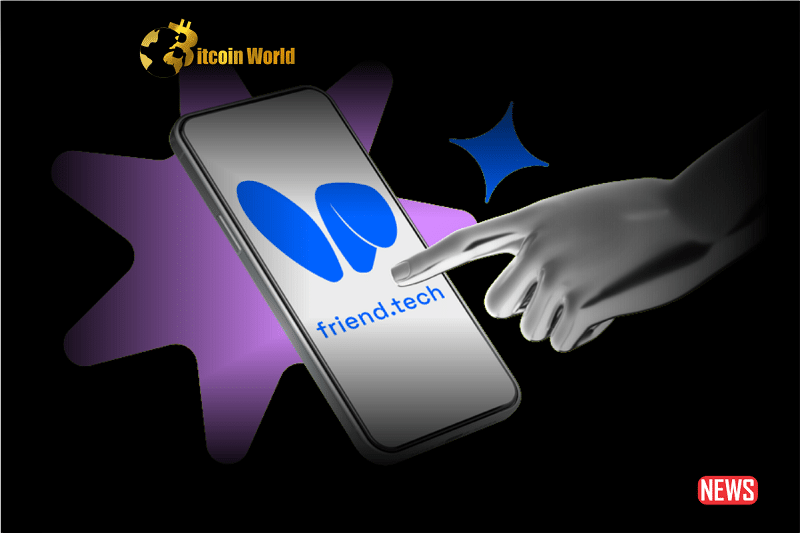The world of decentralized social media (DeSo) is known for its ethos of openness and community. But recently, a new player, Friend.tech, found itself in the hot seat. Imagine building a cool new app, only to face criticism for trying to keep your users from checking out the competition. That’s precisely the situation Friend.tech encountered, sparking a debate about the very principles of the DeSo space.
What Exactly Happened with Friend.tech?
Friend.tech, a tokenized social media platform, made waves when it announced a policy change on August 28th. The gist? Users exploring alternative platforms, often referred to as ‘forks’ or ‘copies,’ would face penalties. Specifically, they would lose the coveted ‘reward points’ Friend.tech was distributing to its early users.
While the announcement didn’t name names, the timing was conspicuous. Shares, a new DeSo application in the ‘SocialFi’ realm, was gearing up for its public beta launch just days later. The crypto community quickly connected the dots.
Why Were These ‘Points’ Such a Big Deal?
Friend.tech had been rewarding its beta testers with points over a six-month period, totaling a significant 100 million. The catch? The exact purpose of these points was shrouded in mystery, fueling intense speculation. Think of it like collecting secret tokens – you know they’re valuable, but the exact value is yet to be revealed.
Theories surrounding Friend.tech Points:
- Governance Tokens: Many believed the points would eventually convert into governance tokens, giving users a say in the platform’s future.
- Financial Value: Others speculated the points would hold direct financial value, potentially through a future token sale or exchange listing.
- Airdrop Anticipation: The fact that Paradigm, a prominent investment firm, had invested in Friend.tech led to widespread anticipation of a native token airdrop for point holders.
The Backlash: Did Friend.tech Cross a Line?
The announcement of the penalty policy ignited a firestorm of criticism. The crypto community, known for its strong belief in decentralization and open access, saw this move as a betrayal of those core values. Within minutes, the Friend.tech announcement on X (formerly Twitter) was flooded with negative comments.
Consider this perspective from CryptoKaleo, a well-known crypto trader: “Threatening/penalizing users for trialing other platforms is completely against everything this industry stands for.” This sentiment echoed across the crypto landscape.
The Founder’s Apology: A Step Towards Damage Control?
The intense backlash prompted a swift response from “Racer,” the pseudonymous founder of Friend.tech. Acknowledging the misstep, Racer apologized, calling the initial statement “stupid” and admitting it stemmed from concerns about competition. This quick turnaround highlights the power of community feedback in the fast-paced world of crypto.
Has the Controversy Impacted Friend.tech’s Growth?
This drama unfolded shortly after Friend.tech’s public launch on August 11th. While the platform initially experienced a surge in popularity, recent data suggests a significant slowdown.
Friend.tech’s Transaction Decline:
Data from Dune Analytics paints a clear picture:
- Peak Activity: Around 525,000 transactions on August 21st.
- Recent Decline: Less than 50,000 cumulative transactions by August 28th.
- Percentage Drop: A staggering decrease of over 90%.
These figures suggest that the controversy may have had a tangible impact on user activity and engagement.
What Does This Mean for the Future of DeSo?
The Friend.tech situation serves as a crucial reminder of the core principles driving the decentralized social media space. So, what are the key takeaways?
Key Lessons from the Friend.tech Incident:
- Community First: In the DeSo world, the community holds significant power. Ignoring their values can lead to swift and significant consequences.
- Openness and Innovation: The spirit of decentralization thrives on open access and the freedom to explore new ideas. Discouraging competition can stifle innovation.
- Transparency is Key: While the mystery surrounding the points initially generated excitement, clear communication about platform policies is crucial for building trust.
- Competition Drives Progress: Healthy competition among platforms ultimately benefits users by offering more choices and driving innovation.
Navigating the Evolving DeSo Landscape
The decentralized social media landscape is still in its early stages of development. Platforms like Friend.tech are experimenting with new models, and these experiments will inevitably come with challenges and learning curves. The key is to learn from these experiences and build a more robust and user-centric future for DeSo.
In Conclusion: A Moment of Reflection for DeSo
The recent controversy surrounding Friend.tech highlights the dynamic and sometimes turbulent nature of the decentralized social media space. While the platform faced significant criticism for its anti-competitive stance, the swift backlash and subsequent apology demonstrate the community’s commitment to the core principles of openness and innovation. As Friend.tech reassesses its approach, the incident serves as a valuable lesson for all players in the DeSo arena: embracing collaboration and respecting user choice are paramount to building a thriving and truly decentralized future for social media.
Disclaimer: The information provided is not trading advice, Bitcoinworld.co.in holds no liability for any investments made based on the information provided on this page. We strongly recommend independent research and/or consultation with a qualified professional before making any investment decisions.




